Belinda Read online
Page 32
Anyway Susan was better off without this being her first release, he repeated. And this is when I jumped in and said, “OK, what are you going to do for her in the States?”
“I can’t promise anything earthshaking,” he said. “But I’ll give it my damnedest.” And then he reached out and shook my hand. “Now that’s that whether you stay or go,” he said. “May I kiss you?”
“Yeah,” I said. “It’s about time.”
The lovemaking was terrific. It was truck-driver bang, but it was great truck-driver bang, probably the best there ever was. And why do I tell you this? Because you have to know to understand everything that happened. You have to know that although this guy never had your skill or your timing, I did eventually love him very much. And, of course, I had only been to bed with boys at that point. I didn’t know what timing was.
Meeting you ended that love for Marty. It really did. You were a dream man to me when I met you—you are serious like the people I knew in the old days when Mom was still making a few good films and I would fall asleep at the table listening to arguments about life and art. You are elegant and refined and you are beautiful in your own neglected and easy way. As~d r~e ~JraJ~g, &ere is ~a~ ~oo, o,c co~rsc, ~he rai~ wbe~ touched each other, those times in bed when you were more purely physical than any man I’d ever been with.
But you see, Jeremy, that’s what it took to kill the love for Marty. Love for Marty was very strong. That night at Cannes was serious stuff.
When he woke up in the morning, he was scared. Probably people looking for me, he said. He didn’t believe me when I told him to relax.
“Get on the thing with Susan,” I said to him. “It isn’t why I went bed with you. I would have done that anyway, but Susan is what I’m worried about right now.”
Now to tell the truth I didn’t think he could influence United Theatricals where Susan was concerned. He was television. So why would anyone in movies listen to him? I mean, sure they killed a movie for his TV but that was easy. How would he ever get a deal for the woman whose picture he killed?
But what I didn’t realize was that United Theatricals, like all big studios, was owned by a conglomerate, in this case CompuFax. And Fax had appointed two studio heads, Ash Levine and Sidney Templeton, right out of daytime TV in New York. Daytime TV. Let that sink in mean, who would have thought people like that could run a movie studio?—but they were running it, and they were Marty’s old New York buddies, they had put Marty where he was. Marty had worked for Sidney Templeton as an assistant producer, in New York City, and Ash Levine had grown up with Marty. Marty had actually hired Ash Levine for first job.
Now let me say here that there is a Hollywood story about Marty and Ash Levine—that one time in New York they got into a real jam fighting some kids on a rooftop and, when the kids ganged up on Ash, it was Marty who grabbed one of them and literally threw him off the roof. The kid died when he hit the pavements, and the gang scattered, and that is the only reason Ash is alive right now—and maybe Marty, too. I don’t know whether that is really true. Marty would only smile and wave it away when I asked him. But I heard it in several places in Hollywood, and it was always given as the reason why Marty could have asked anything he wanted of Ash Levine.
By noon Marty and Susan and I were in the United Theatricals suite with these guys, Templeton and Levine. And these three men in their impeccable three-button suits were giving Susan the great rolling LA soft soap about the talent she had as a director and what a miracle it was that even with Mom’s backing she had brought in that film.
Now Susan was sitting there with her white cowboy hat on, in her silk shirt with the fringe on the sleeves, and the white jeans, just listening to these guys, and I thought, She knows, surely she knows they screwed her and Marty is the one who did it—I know she knows and she is going to blow. But then something happened, which gave me to know that Susan would make it in Hollywood.
And, by the way, Susan already has.
Susan said not one word about the past but went right into her pitch for the Brazilian film. She told them the whole thing first off in one line, you know, what these guys call “high concept,” probably one of the worst terms to ever come down the pike. American teenager saved from Brazilian white slavers by courageous American female reporter. Then she went into detail, calmly handling every objection they raised no matter how dumb it was. I mean, she took this film we had worked out in a frenzy of creativity, and she was willing to spoon-feed it to these fools.
And take it from me, these guys are fools. They really are fools. I mean, they said things to Susan like, How are you going to make Rio interesting? And what made her think she could write the script herself?
But it was when they talked about avoiding the lesbian overtones that I really got scared. But Susan didn’t bat an eye at that one. She said Of Will and Shame was completely different from Final Score in that it was puritanical basically. I’d play an exploited prostitute, not a free spirit. All the sex we’d show would be bad.
I almost fell over dead when Susan said this. But they understood exactly. The moral hook would be there. The American woman reporter would take me away from sex, not go to bed with me. No lesbian overtones at all.
They were nodding, saying, Sounds good, and when could she let them see the script? They wanted to talk when she got to LA.
Finally it was over and she and I went out together and I was scared to death that she was going to ask me if I’d gone to bed with Marty and didn’t know what to do if she did. But she just said: “They’re assholes, I think we sold them. Now I have to go and get Final Score shown if ever I can.”
Susan left Cannes immediately. But she had really impressed everybody That night Ash Levine asked me to tell him all about her. Sidney Templeton liked her. And Marty liked her, too.
And she did get Final Score shown in art houses and festivals all over Europe. It was penny-ante stuff. But she gave it a life. And months later, when I was on the run, I was able to get a tape cassette of it from special mail order house because Susan had given it that life.
Anyway after the meeting I went back to the suite, and Mom grai me and kissed me and said, Wasn’t it terrific that we were going to wood and this time they really wanted us. Just pure Mom. She got me the bedroom, and she started sobbing, saying how this was like some dream and she still wasn’t sure it was happening, and she looked around at all the flowers and she said, “Is all this really for me?”
I didn’t say anything to her. And she acted just as if I’d answered her. She just went on talking about how great it all was, as if I was saying, Yes, Mom, the whole time. I was not saying a word. I was watching her, anti thought she really doesn’t know what happened with Final Score. doesn’t know at all. And something happened inside me. It was as if I lost interest in her in a way. I mean, the rage I’d felt earlier was gone. thought she had lost her ability to hurt me, that maybe once and for all I had really learned. Mom would never change. I had to change. I had expected nothing from Mom.
Of course, I was wrong. I hadn’t learned. What had happened was that I had Marty, and that felt so good and so warm and so special that I was protected, that’s all.
We went right from Cannes to the U.S. although Trish and Jill went back to close up the house on Saint Esprit. Marty had to start shooting with Mom almost immediately to have everything ready for the fall season. I mean, “Champagne Flight” had to be completely rethought and rewritten with Mom.
And Marty wanted Mom to go to the Golden Door in San Diego and take off more pounds right away. Mom was actually perfect, if you want my opinion, but not by the anorexic standards of today.
So anyway Uncle Daryl went on to Beverly Hills to get our house ready—we had owned this house for years but never lived in it—and Marty and I checked Mom into the Golden Door and five minutes later were making love in the limousine on the return drive to LA.
For the next three weeks Marty and I were together constantly, either at my room in the Bev
erly Wilshire or in his office at United Theatricals or in his penthouse apartment in Beverly Hills. Of course, he couldn’t believe nobody was checking on me, that the only “supervision,” as he kept calling it, was Uncle Daryl having breakfast with me each morning at the Bev Wilsh and saying, “Here, go buy yourself something pretty at Giorgio’s.” But that is exactly the way it was. And I did tricks to keep it cool, too, I have to admit that, like leaving messages for Uncle Daryl about hairdresser appointments and things that made it sound like I was checking in when I was not.
And in a way this was the best time for Marty and me.
He took me all through United Theatricals. He had a big corner office there, and I watched for hours while Marty was at work.
In April he had already shot a complete two-hour season opener for “Champagne Flight,” and now he was scrapping it and doing a whole new thing with Mother, and he had to get the network to go along. As producer-director of the show, he had a huge hunk of it—it was his life, as you can imagine—and I watched him write the script for the first show while he ate lunch, talked on the phone, and screamed at his secretary all at the same time.
At absolutely any minute Marty would want to drop everything and make out.
If we weren’t doing it on the leather couch in his office, we were doing it in the limo or in my room.
Even when Trish arrived, nothing changed. Though, of course, I never provoked anybody’s attention. If Marty stayed over, he hid in the bathroom when Trish came in.
But it was strange the effect this freedom had on Marty. At first I thought he was just scared of being caught with me. After a while I saw he did not like it. He did not approve of it. He actually thought Uncle Daryl and Trish were negligent. I got a kick out of that. “Leave well enough alone, OK?” I said.
And this affair was really love to us, I swear that it was. You understand, I didn’t sit there and think, well, this guy really loves me and I love him. It was just happening very intensely all the time. We would talk a lot about my life in Europe. Marty was really stage-struck. He really wanted to hear my stories about meeting Dirk Bogarde or Charlotte Rampling when I was four years old. He wanted me to tell him what skiing felt like. He was very worried about his table manners. He wanted me to watch him when he ate and tell him what he did wrong.
He talked a lot too about his Italian family, how he hated school, how he’d wanted to be a priest when he was little, how he hated his return trips to New York. “Things aren’t real out here,” he’d say about California, “but God, they are too real back there.”
What came clear was that Marty really wanted to analyze things and didn’t know how. He’d never taken a college class or talked to a psychiatrist, but he had a terrific drive to figure things out.
Telling the woman in his life his inner feelings, well, that was a real trip for Marty. The dam broke for him in those days. Suddenly talk meant something for him it had never meant before. And I came to realize that although he was very uneducated, he was also very smart.
Susan had been to the University of Texas and film school in LA after that. You are a highly educated man. Mom had even taken college courses. Jill and Trish had done their four years at SMU. But Marty had quit in the junior year of public high school in New York. Every day Marty heard remarks, references to things, even jokes he didn’t understand.
I mean, we would watch the old reruns of “Saturday Night Live” on TV and he would grab my arm and say, “Why are you laughing, what does that mean? .... Monty Python’s Flying Circus” was totally unintelligible to Marty. Yet Marty could go to see a film like Last Year at Marienbad and pay close attention to everything and come out and tell you just what went on.
Well, all that is not important now. Except to say that I know Marty and I loved him, no matter how it might look to anyone else. Things happened between us, things that no one may ever understand.
But as soon as Mom checked out of the Golden Door and we got on the plane for LAX from San Diego, Marty pretty much had to be devoted to her. Mom took over just as she had taken over in Cannes.
And much as Mom loved Trish and Jill and wanted them to stay in the new Beverly Hills house, Marty pretty well pushed them out of the way. It wasn’t deliberate on Marty’s part. He was simply more forceful. Mom really listened to Marty. Jill and Trish were her sisters. I was her sister. But Marty was the boss.
Marty supervised everything from the start. And he moved into his own rooms in the Beverly Hills house five days after Mom came back.
Now let me describe this house. It is in the flatlands of Beverly Hills, and it is enormous and old with the screening room in the basement, and the billiard room and the forty-foot pool outside and the orange trees all around. Uncle Daryl had bought it in the sixties for Mom. And Mom had never wanted to live in it. And Uncle Daryl had rented it out all these years. He had gotten the tenants to carpet it, furnish it, redo the pool, as part of various rental deals. As a consequence, Mom now owns a three-million-dollar hunk of California real estate with an all-electric kitchen, wall-to-wall carpets, mirrored dressing rooms, automatic sprinklers to water the gardens, and electric eyes to turn on the outside lights at dusk.
But it is not a great house. It does not have the beauty of our apartment in Rome or our villa on Saint Esprit. It does not have the charm of your narrow cluttered Victorian in San Francisco. It is in fact a string of cubicles done in decorator colors with a special faucet in the kitchen that gives you boiling water for coffee night or day.
Yet we enjoyed it. We wallowed in padded luxury. We lay on the patio under the filthy blue sky in smog-ridden Los Angeles and told ourselves it was OK.
And those first few weeks we did have a damn good time.
Marty took Mom to work every morning and stayed with her every minute through the shooting, often rewriting lines for her on the spot. Then he sat with her through dinner, making her eat everything on her plate. Only at eight did Jill and Trish take over, making her get in bed to talk or watch television so she’d be sure to be asleep by nine.
That’s when Marty and I were together, locked in his bedroom or mine. We sat in bed together, reading scripts for “Champagne Flight” and talking about them and what was good and bad and all that.
Marty had a guarantee for at least thirteen onc-hour episodes, and he was determined to do as much as he could before the big premiere in September. He often entirely rewrote the scripts himself.
By July I was helping him with this. I was reading material out loud to him during lunch or while he was shaving, and sometimes rewriting scenes myself. I advised on little details about the movie star character that Mom was to play. I wrote a whole scene for the third show of the season. I don’t know if you ever saw it, but it was OK.
Finally Marty would say, Hey, Belinda, knock this down to two pages, will you? And I would do it, and he would just pass the scene on.
I loved all this. I loved working and learning things and watching how the show was done. Marty had very clear ideas about how things were to look and sometimes he didn’t have the vocabulary to explain it. I went through magazines, showed him things, until he said, “Yeah, that’s what I want, that’s it.” And when he finally got the right designer, well, things really took off.
Sometimes we left the house right after Mom had dinner. We went to the studio together and worked till two or three. And nobody seemed to take much notice of what was happening between us, and I was so involved in it I didn’t think much about doing any acting of my own.
Understand, only a couple of months had passed since the Cannes festival and we were so busy.
Then one afternoon when I came home, Blair Sackwell was there, dressed in a silver jumpsuit and silver tennis shoes, nothing out of the ordinary for Blair actually, and looking like an organ grinder’s monkey, and he jumped up off the couch and asked me why I was turning down everything after my big smash debut at Cannes.
Trish and Jill just looked confused. But Trish and Jill were always look
ing confused now.
Blair said some producer had even called G.G. in New York, he was so desperate to get in touch with me, and didn’t I think I could stop being Greta Garbo? I mean, I was only fifteen.
I told Blair nobody had offered me anything, at least not that I knew of, and he just scoffed at that. He said Dad sent his love to me. Ollie Boon had a musical opening in New York right now or Dad would have been here, too.
But Blair’s main concern was getting Mother to do the Midnight Mink thing again. Would I kindly talk to her? She’d be the only one in the entire world, he said, to do Midnight Mink twice.
I went into the other room and called Marty at the studio. Did he know anything about me being asked to do any movie roles? He said, no, he certainly did not, but I knew, didn’t I, that my uncle Daryl had said a fiat-out no to my being in “Champagne Flight.” But I knew that, didn’t I? He thought I knew that. Was I unhappy? What was going on? Tell him right now.
“Calm down, Marty,” I said, “I was just asking you.” Then I called Uncle Daryl, who was back in Dallas at his law office and he told me right off that Mom’s agent, Sally Tracy, had orders to keep producers away from me. He had given Sally strict instructions that Bonnie wasn’t to be bothered by people calling for me. Bonnie had no time to be worried about this. And he wanted all that Final Score business to just wither and blow away.
I called Sally Tracy. “Belinda, sweetheart!”
“You’re not my agent, are you?” I asked her. “Are you turning down parts for me?”
“Well, darling, Bonnie doesn’t want you pestered by these people. Darling, do you know the kind of offers you’re getting? Sweetheart, have you seen these teen exploitation pictures?”
“I would like to know if somebody calls for me. I would like to know if I have an agent. I would like to be told these things.”

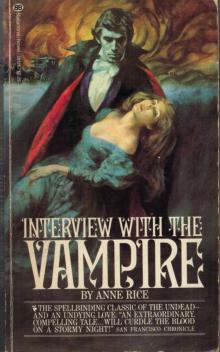 Interview with the Vampire
Interview with the Vampire Christ the Lord: Out of Egypt
Christ the Lord: Out of Egypt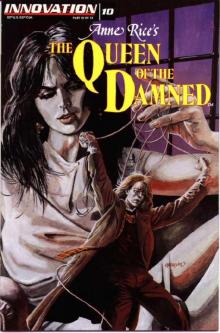 The Queen Of The Damned
The Queen Of The Damned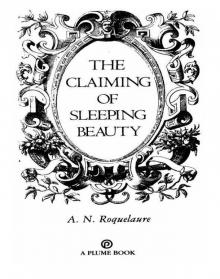 The Claiming of Sleeping Beauty
The Claiming of Sleeping Beauty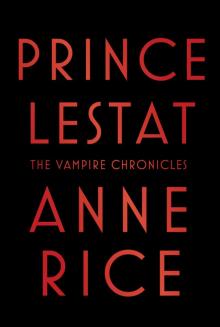 Prince Lestat
Prince Lestat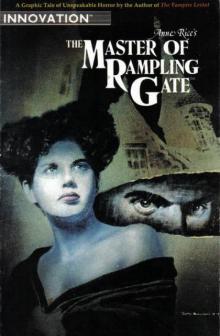 The Master of Rampling Gate
The Master of Rampling Gate The Vampire Lestat
The Vampire Lestat Blood Canticle
Blood Canticle Beauty's Release
Beauty's Release Pandora
Pandora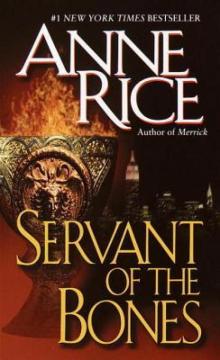 Servant of the Bones
Servant of the Bones Of Love and Evil
Of Love and Evil Beauty's Punishment
Beauty's Punishment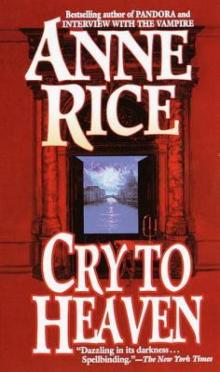 Cry to Heaven
Cry to Heaven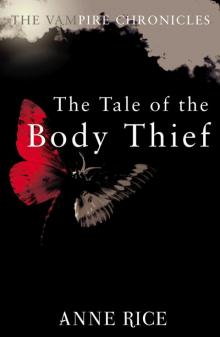 The Tale of the Body Thief
The Tale of the Body Thief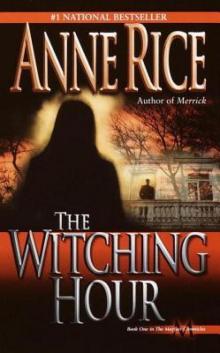 The Witching Hour
The Witching Hour Memnoch the Devil
Memnoch the Devil Blackwood Farm
Blackwood Farm Beauty's Kingdom
Beauty's Kingdom Belinda
Belinda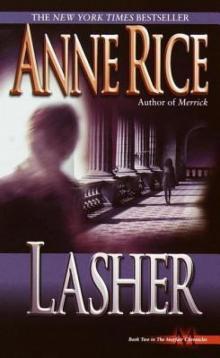 Lasher
Lasher Vittorio, the Vampire
Vittorio, the Vampire Angel Time
Angel Time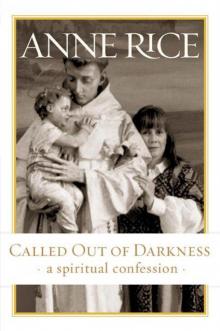 Called Out of Darkness: A Spiritual Confession
Called Out of Darkness: A Spiritual Confession Blood And Gold
Blood And Gold The Passion of Cleopatra
The Passion of Cleopatra Taltos
Taltos Exit to Eden
Exit to Eden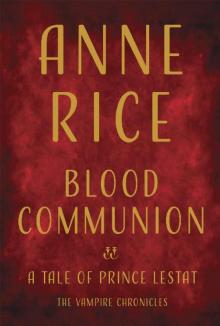 Blood Communion (The Vampire Chronicles #13)
Blood Communion (The Vampire Chronicles #13) The Wolf Gift
The Wolf Gift The Wolves of Midwinter
The Wolves of Midwinter Prince Lestat and the Realms of Atlantis
Prince Lestat and the Realms of Atlantis The Ultimate Undead
The Ultimate Undead The Vampire Lestat tvc-2
The Vampire Lestat tvc-2 The Road to Cana
The Road to Cana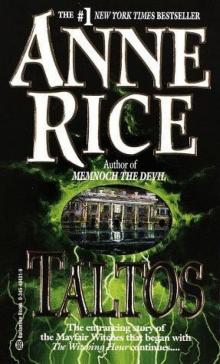 Taltos lotmw-3
Taltos lotmw-3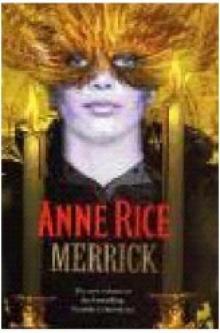 Merrick tvc-7
Merrick tvc-7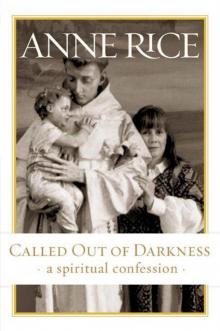 Called Out of Darkness
Called Out of Darkness Pandora - New Vampires 01
Pandora - New Vampires 01 Bllod and Gold
Bllod and Gold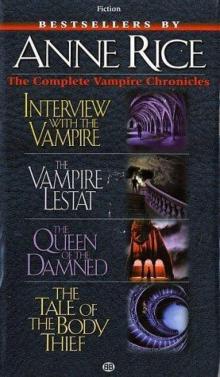 The Queen Of the Damned: Vampire Chronicles
The Queen Of the Damned: Vampire Chronicles The Sleeping Beauty Trilogy
The Sleeping Beauty Trilogy The Claiming of Sleeping Beauty b-1
The Claiming of Sleeping Beauty b-1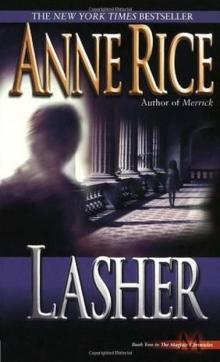 Lasher lotmw-2
Lasher lotmw-2 The Tale of the Body Thief tvc-4
The Tale of the Body Thief tvc-4 The Vampire Chronicles Collection
The Vampire Chronicles Collection Ramses the Damned
Ramses the Damned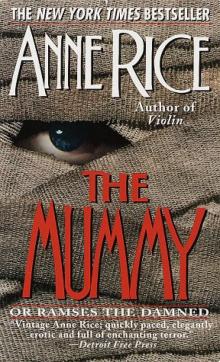 The Mummy - or Ramses the Damned
The Mummy - or Ramses the Damned Vittorio, The Vampire - New Vampires 02
Vittorio, The Vampire - New Vampires 02 The Vampire Armand tvc-6
The Vampire Armand tvc-6 Queen of the Damned tvc-3
Queen of the Damned tvc-3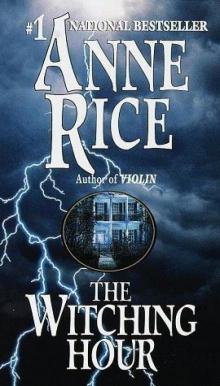 The witching hour lotmw-1
The witching hour lotmw-1 Feast of All Saints
Feast of All Saints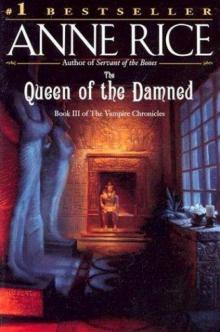 Queen of the Damned
Queen of the Damned The Wolves of Midwinter twgc-2
The Wolves of Midwinter twgc-2 The Mummy
The Mummy Blood and Gold tvc-8
Blood and Gold tvc-8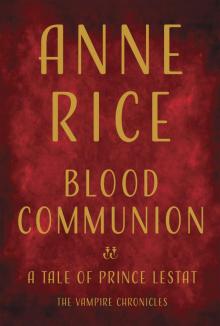 Blood Communion
Blood Communion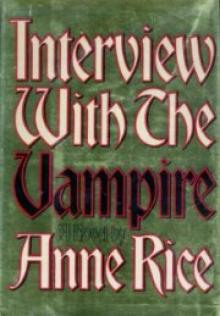 Interview with the Vampire tvc-1
Interview with the Vampire tvc-1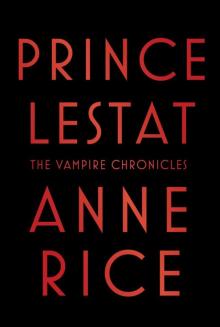 Prince Lestat: The Vampire Chronicles
Prince Lestat: The Vampire Chronicles